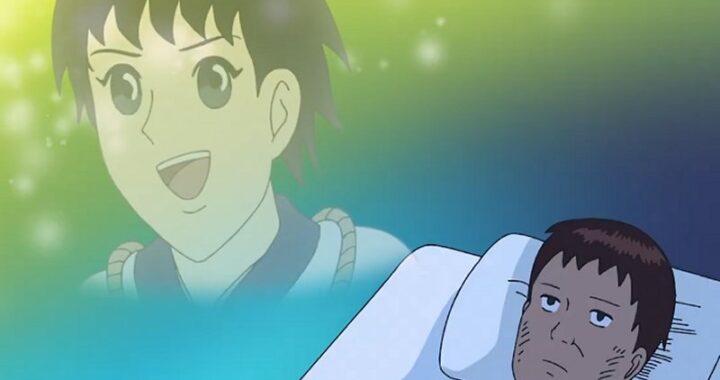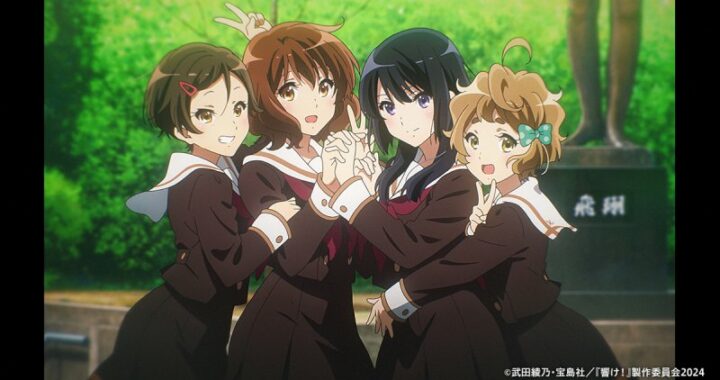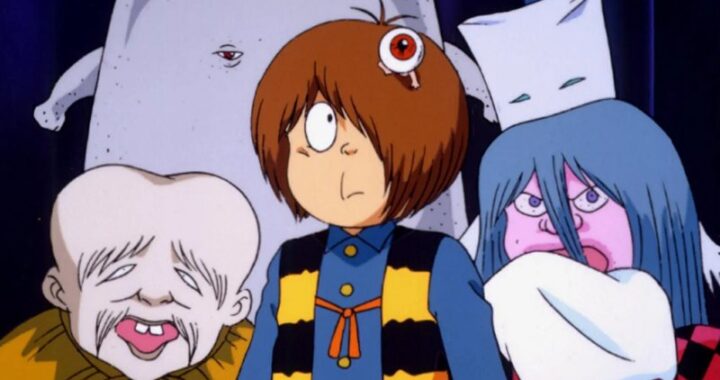
What They Say:
Relive the classic era of anime with the studio that brought you Escaflowne, Fullmetal Alchemist, and Wolf’s Rain. Eureka Seven, the greatest anime love story ever told, returns to the spotlight after almost a decade!
Renton’s adventure continues as the burgeoning hero struggles to balance the rush of young love against an onslaught of riveting revelations. Eureka’s shocking origins come to light, the truth about Norb surfaces, and secrets emerge that force everyone to question their allegiances. As Eureka and Renton finally reach Earth, a mysterious facility hiding tragic experimentation is discovered. The fate of the world is at stake as Eureka beings her harrowing transformation. Only Renton has the power to save her, but at what cost?
The Review:
Audio:
For this viewing I listened to the English track presented in Dolby Digital Stereo. A Japanese language track also in Dolby Digital Stereo is available along with English and Japanese subtitles. There was no real directionality or other aural tricks that I could discern on this release, but the sound quality is fine. I had no trouble hearing the dialogue, music, or sound effects.
Video:
Eureka Seven is a very pretty series and holds up very well considering that it is almost a decade old. Each episode is presented in 4:3 aspect ratio. The colors were vivid, the actions easy to follow, and no distortions or other issues were visible. Visually this is a great show.
Packaging:
Eureka Seven comes in a standard Blu-ray case with the twenty-three episodes spread across four discs housed in a center inset. A fifth disc containing extras is placed in the back cover. The case comes in a slip cover that replicates the case’s images and text. The front cover is bisected with the left side red and the right side blue. A white line divides the two sections. Anemone stands on the left with her back turned to us. Her arm extends beyond the white divider as she holds a flower to Eureka, who stands on the right side. Eureka stands with her body facing forward, but her head tilted towards Anemone. Her left arm has undergone a transformation and she holds it with her right. The show’s logo sits in the bottom-left hand corner over Anemone’s feet.
The spine is nearly identical to the design of the spine on Part One save for the text and slanting lines being in red and not blue. The back cover continues this design scheme, being nearly identical to the back cover for Part One, only instead of a blue background, the summary, screenshots, Blu-ray specifications and whatnot are placed against a red background. Overall, the like Part One, this is a functional and easy-to-read design, but isn’t visually exciting.
Menu:
Part Two’s menu is exactly the same as Part One’s: the entire background is blue and the show’s logo is written in a clear white font. The disc options run underneath the logo, also in white font. The option being chosen changes to a pink font. White, slanting horizontal lines run vertically down the right side of the screen, and subtle music plays on a ten second loop. As a menu design, it’s functional, but like the case art, is rather dull.
Extras:
The amount and type of extras on this set is very impressive, running at 103 minutes. There are episode commentaries, clean Op/Ed, trailers, and voice actor interviews. Like the previous set, I found the commentaries tended to be a bit ramble-y, but I quite enjoyed watching the voice actor interviews because both the Japanese- and English-speaking voice actors were featured
Content: (please note that content portions of a review may contain spoilers)
Renton has rejoined Gekkostate after his brief time away with the freelancers Charles and Ray. His experiences away from Holland and the crew have seasoned him to an extent and when he returns he’s a stronger, more focused person. However, he is still a fifteen-year-old boy and has difficulties understanding and acting upon the powerful feelings he has for Eureka, but if his world is to survive, he must become her partner and the two must bring out the full potential of the Nirvash.
Eureka Seven Part Two continues right where Part One left off and the conclusion plays over the final twenty-three episodes. As I had hoped, mysteries were answered, but I found that the pacing of the answers and the awkward, pseudoscientific/philosophical/religious manner in which they were given made them rather confusing. In addition to that, some plot elements were played out improperly, creating weak character motivations and unsatisfying villains. There are moments when the show fires on all cylinders and it’s easy to get swept up in the drama of the moment, but those moments are inconsistent and surrounded by scenes that fall flat due to the show’s inability to get a handle on its core concepts and characters.
For example, it’s revealed here that Eureka is a Coralian. When Renton learns this, his reaction is the same as mine, “I don’t know what that means.” It turns out that a Coralian is a creature created by something called the Scrub Coral, but even that wasn’t explained until later in the series. Not understanding what a Coralian is takes away the dramatic power of the moment. We understand that Eureka is not human, but we already knew that thanks to how she acts and the little bit of information about her past we were already made privy to. This gives a name as to why she’s not human and allows us to view her as more than just “not-human,” but it’s more of a category change than a revelation.
Related to this is how the main antagonist, Dewey, is handled. We learn that he is Holland’s brother and that he and Holland come from some sort of nobility. We also learn that he believes that he is the “Sacrificial King” whose position was usurped by Holland’s birth because their mother died in labor. Her death was the sacrifice that brought him into the world and connected him with the land. Dewey sought to change this by killing their father, which didn’t really work out all that well for him. Dewey understands about the Scrub Coral, the Coralians, and the “Limit of Questions” (more on that in a minute), but feels like the Scrub Coral has taken away humanity’s “dignity” and seeks to destroy it because of that. This might be a compelling reason except for the fact that it doesn’t make a lick of sense. Obviously Dewey is insane, but even insanity goes by some sort of rules and structures—the problem is that they don’t conform to the agreed-upon conception of reality as defined by society, and that they can lead individuals to undertake violent acts against themselves and others. Why Dewey believes that he is the Sacrificial King or why he believes that the Scrub Coral has taken away human dignity is unclear, and because of this, he comes off as a cardboard villain who is insane and evil because that’s what the plot demands, not because that’s who he is as a character.
Some of the concepts that informs Dewey’s insanity stems from the book The Golden Bough by Sir James George Frazer. It’s a real book and one of the seminal works of myth study. We are shown both Dewey and Holland reading it from time to time, and it’s certainly where the concept of the Sacrificial King comes from; however, why these characters have glommed on to the concept is never explained. Was their family somehow responsible for keeping the Scrub Coral in check? For keeping it asleep so that they never faced the Limit of Questions? Did it involve some sort of sacrifice? It’s never stated and only plays at being relevant. In some ways it serves as a half-ass attempt to satisfy Chekov’s famous gun on the mantelpiece dictum: if there is a gun on the mantelpiece in Act One, it must be fired by Act Three.
This failure to capitalize on its concepts is a hallmark of this series. The use of The Golden Bough is certainly one of the more egregious, but the concept of the “Limit of Questions” certainly runs a close second. The basic idea is that if there are too many lifeforms existing in one place then reality will collapse. Apparently the Scrub Coral understands this and has chosen to hibernate, but Dewey’s campaign against it threatens to awaken the Scrub Coral and bring about the Limit of Questions. Why he does this isn’t quite clear. He either understands that this will happen but doesn’t care because he hates the Scrub Coral that much, or he believes that this deforming of reality will lead to the creation of another world. I’m not even sure what would happen if the Limit of Questions is reached. It’s a great name, but it’s awkwardly and confusingly explained.
It’s a real shame that Eureka Seven couldn’t capitalize on its concepts, because it does feature some interesting ideas. The merging of surf culture and counterculture with mecha is interesting, and the themes of personal identity, the importance of family, and environmentalism were equally intriguing, but they never quite came together, and when the answers began to be offered, they came too little, too late and piled one on top of the other. If the show had established some of the more key items of information earlier, it might have worked better. I think that the idea was that we as the audience were supposed to be kept just as much in the dark as Renton and the general populace, but it just doesn’t quite work.
What does work are the little moments, and I think that that has a great deal to do with the soundtrack. I don’t typically write about the soundtrack, but it occurred to me watching this that the moments that worked the best—the moments where I fully bought into the world, the action, and the characters—was when the music turned up full swell. It created a sense of drama and immediacy during certain action and drama scenes that pulled me in completely. Naturally, music alone can’t support a show—especially one that lasts for fifty episodes—but this is a good example of how important it can be in creating and/or enhancing mood.
In Summary:
As much as I hate to say it, Eureka Seven Part Two was about as disappointing as Part One. There were moments when I enjoyed the story, and I appreciate the show’s ambition, but too often the characters served the plot instead of the other way around, and the concepts and themes that ran under the series simply weren’t introduced well or properly explained. I would say that the series as a whole is probably worth checking out given its place in fandom, but fifty episodes is quite a commitment, so I hesitate to recommend this. I certainly don’t regret watching it, but I doubt I ever will again, so consider this recommended with strong reservations.
Features:
Japanese 2.0 Language, English 2.0 Language, English Subtitles, Episode Commentary, Interview with Japanese Voice Actors Keiji Fujiwara (Holland) & Michiko Neya (Talho) Parts 2 & 3, Interview with English Voice Actor Crispin Freeman (Holland) Parts 2 & 3, Interview with English Voice Actor Kate Higgins (Talho).
Content Grade: B-
Audio Grade: A
Video Grade: A
Packaging Grade: B-
Menu Grade: C
Extras Grade: A
Released By: FUNimation
Release Date: April 22nd, 2014
MSRP: $44.98
Running Time: 575 Minutes
Video Encoding: 1080 i/p
Aspect Ratio: 16:9
Review Equipment:
Panasonic Viera TH42PX50U 42” Plasma HDTV, Sony BPD-S3050 BluRay Player w/HDMI Connection




